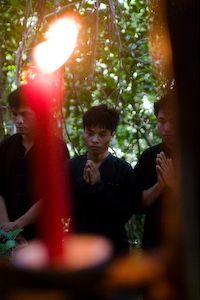Tu is 21 years old, and has just graduated from University studying agriculture. At Lanh's invitation, her family has moved from their village where they were growing commercial rice, onto the farm school property to start up a sort of model farm using only permaculture techniques. Back at home they grew wetland rice - the rice grown in big flat lowland paddies. Now they are in the mountains, they're struggling, because they don't know how to grow upland rice - the kind of rice they grow here - in terraced fields. So they have to buy rice, and the new organic farm that they're just beginning to get going here doesn't provide them with anything left over to sell. Her mother and father are thinking about going back to their village where they can grow enough rice to feed their family, while she and her brother run the farm here. But they're a very close family. She would miss her parents so much if they had to do that. She's really worried, and starts to cry during our interview. It's been a hard move.
After the interview I sit down with the rest of the students. These are a chosen few who are here for an intensive three year course of study. Lanh's goal is partly to teach these young students organic agricultural techniques that they will then return to their villages with, seeding regions throughout Vietnam and Laos with what she hopes will be create the core of a nationwide sustainable agricultural model. "They're missionaries" she says, laughing.
Conversely, the school gains from the students as well, gleaning what traditional knowledge they have learned from their parents and grandparents, and from village lore, that they can adapt to what they're learning here. I ask Lanh how she picks her students, and she says they have to be truly interested in learning farming to come here, which, she points out, eliminates about 90% of the population right off.
The students are mostly talking about how their villages are growing just enough surplus to be able to buy the next year's worth of commercial fertilizer. If the promise of higher yields from commercial fertilizer worked at one point, they don't any more. Their villages are getting hungrier and hungrier.
The problems for farmers are the same everywhere: is there a way to grow enough food to eat, and some left over to sell for the things you need to buy, like clothes, gas, a motorbike? These kids are asking, can organic farming grow as much, or more, than commercial farming? Can a family grow enough food to sustain itself?
Tu invites us to her family's house, and for all kinds of reasons, all the students come along with us. So much for an intimate conversation, I think. So sitting down with 20 of us in the room I ask my questions. But Tu's mom doesn't hesitate - she lays out the core problem - they've moved here from another region - they don't know how to grow upland rice. The students confer - two Hmong boys say they know how - they'll help to build the terraces, and show them about growing that kind of rice. The problem isn't solved, but maybe it's one step closer to working.
Our last day, we drive to the highest point on the land, and then walk up an almost vertical path to the top of the mountain above the road. The students are carrying silver platters and baskets full of offerings, dressed in their best clothes, but seem to manage the climb easily nevertheless. Back at home all of them practice some form of animism, or nature worship. We're going to hold a ceremony, honoring the largest tree on the land, and inviting the nature spirits to come to this place. This high on the mountain the wind whips through the top of the trees, making my microphone boom. The prayers, written on paper, are burned at the end of the ceremony. Good luck for us, Lanh tell me the next day. The prayers all burned to ash, no paper left behind. The nature spirits accepted their offerings. The farm school is welcome here.





